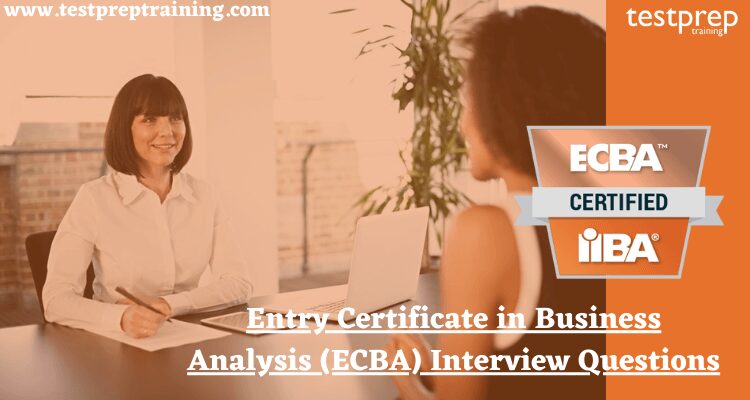ECBA Entry Certificate in Business Analysis
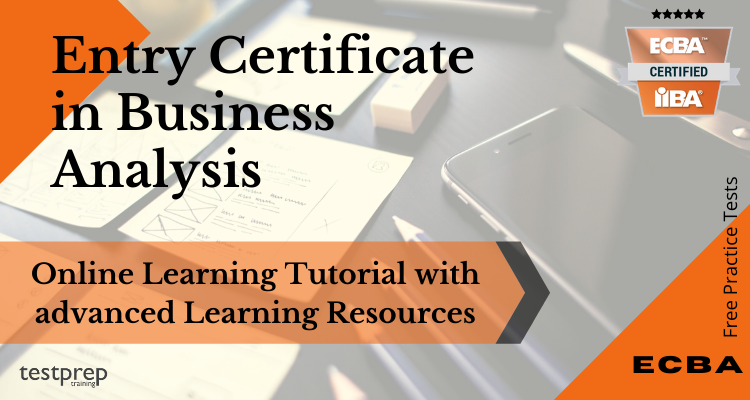
IIBA gives the ECBA Certification. The business analyst serves as a link between the end-user and the project manager, designing and scoping useful business process adjustments and optimizations. ECBA certification is a professional certification for business analysts who want to improve their swarm intelligence skills. Not just to deliver a project on schedule, scope, and budget, but also to have access to the tools and resources needed. However, they also contribute to the overall success of the company.
No prior expertise in business analysis is required for the ECBA test. In summary, if you want to master business analysis and pursue a career in the sector, the ECBA certification is the right choice for you.
Target Audience
The ECBA exam is designed for candidates having exceptional analytical and conceptual thinking skills. The candidate seeking certification in business analysis must have a track record together with excellent planning and time management skills. Moreover, it is highly suggested that the candidates must have experience in leading and performing top-performing teams. Subsequently, a history of managing and holding up successful projects will be a cherry on the top.
Prerequisites
Primarily, anyone who wants to build a career in business analyst must have the following skills in store–
- A bachelor’s degree in business or a related field or an MBA.
- A candidate should be the holder of a minimum of 5 years of experience in business analysis. Similarly, experience in related fields is also counted good.
- The ECBA exam requires competency in Microsoft applications including Word, Excel, and Outlook.
Exam Guidelines
The ECBA: Entry Level Certificate in Business Analysis is a certification test based on the International Institute of Business Analysis’ BABOK version 3.0 business analysis body of knowledge. The following are the guidelines that must be followed in order to obtain ECBA accreditation.
- The ECBA test does not require any prior business analysis expertise. In summary, if you want to master business analysis and pursue a career in the sector, the ECBA certification is the right choice for you.
- The cost of ECBA certification is significantly less than that of other business analysis certification tests. That is to say, if you are new to the business analysis field and want to demonstrate your expertise, the ECBA is the certification for you.
- Keep in mind that the questions on the ECBA certification exam are not normal. They’re more straightforward inquiries.
ECBA Exam Format
The ECBA test is an online remote proctored exam with a 60-minute time limit. There will be 50 multiple-choice questions in the ECBA test. The fact that there is no negative marking on the test is a huge plus for the students. The IIBA, on the other hand, does not have a fixed passing score for the ECBA test. In the case of ECBA exam costs, the IIBA divides them into two groups: IIBA members and non-members.
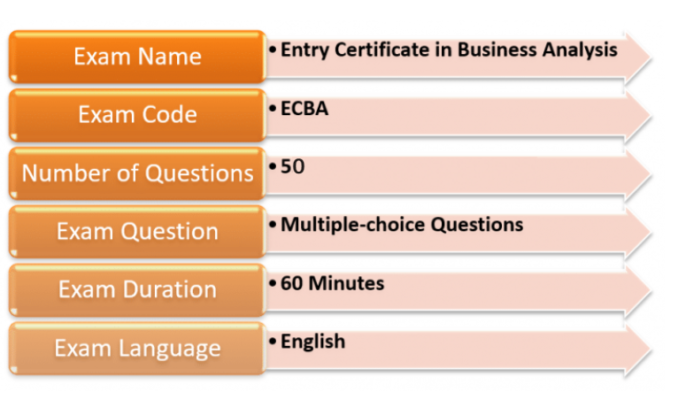
The application fee is the same. Though, the examination fee differs between IIBA members and non-members. The IIBA members savour the bonus of 110 USD over 235 USD paid by IIBA non-members. For more information regarding the same, view the image below.
First Region Countries: USA, Canada, Australia, United Kingdom, United Arab Emirates & more
Second Region Countries: Singapore, Taiwan, South Africa & more
Third Region Countries: India, Argentina, Pakistan & more
Exam Blueprint
A course outline refers to the blueprint of the exam which sets course goals for the potential candidates. This plays an essential role in informing the candidates about the material they need to engage themselves in. The IIBA has defined the weightage into two categories a) general areas and b) knowledge areas for ECBA Certification. These areas collectively constitute the course outline for the ECBA exam. The ECBA exam blueprint covers the following concepts:
1. Business analysis and the BA professional (2.5%)
(IIBA Documentation: What types of Business Analysis Certification are available?)
- Understands what business analysis is
- Understands who a business analysis professional is
2. Underlying competencies (5%)
(IIBA Documentation: A Guide to Developing a Training Plan for Advancing Business Analysis Competencies)
- Understands analytical thinking and problem solving
- Understands behavioral characteristics
- Understanding business knowledge
- Understands communication skills
- Understanding interaction skills
- Understands tools and technology
3. Business analysis of key concepts (5%)
(IIBA Documentation: BACCM Overview – The Core Concepts Business Analysis Core Concept Model)
- Understands The Business Analysis Core Concept Model™
- Understands key terms
- Understanding requirements classification schema
- Understands stakeholders
- Understands requirements and designs
Entry Certificate in Business Analysis (ECBA) Interview Questions
4. Techniques (12.5%)
- Understand the techniques and recognize the key elements of the competency and why they are important. However, it is not expected to have the experience nor skill level to act upon the competency.
5. Business analysis planning and monitoring (5%)
(IIBA Documentation: Business Analysis Planning and Monitoring)
- Plan Business Analysis Approach
- Plan Stakeholder Engagement
- Planning Business Analysis Governance
- Plan Business Analysis Information Management
- Identify Business Analysis Performance Improvement
6. Elicitation and collaboration (20%)
(IIBA Documentation: Elicitation and Collaboration)
- Prepare for Elicitation
- Conduct Elicitation
- Confirm Elicitation Results
- Communicate Business Analysis Information
- Manage Stakeholder Collaboration
7. Requirements life cycle management (20%)
- Trace Requirements
- Maintain Requirements
- Prioritize Requirements
- Assess Requirements Changes
- Approve Requirements
8. Strategy analysis (5%)
(IIBA Documentation: Strategy to Execution Framework)
9. Requirements analysis and design definition (24%)
(IIBA Documentation: Requirements analysis and design definition)
- Specify and Model Requirements
- Verify Requirements
- Validate Requirements
- Define Requirements Architecture
- Define Design Options
- Analyze Potential Value and Recommend Solution
10. Solution evaluation (1%)
(IIBA Documentation: Solution evaluation)
Certification Process
Certification Fees

To go through the certification process, follow the following steps
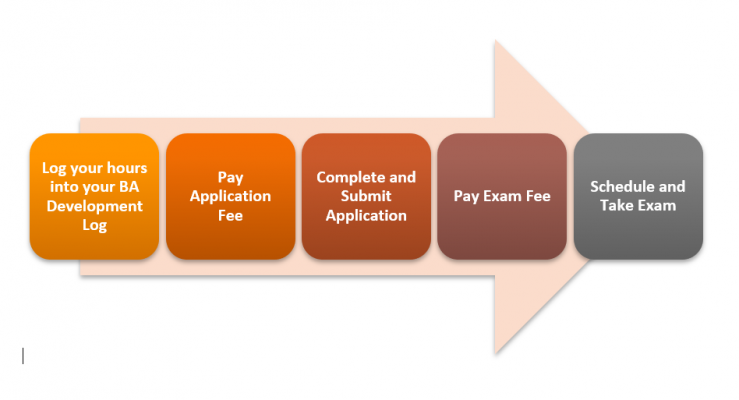
Step 1 – Log your hours into your BA Development Log
- To be included in your application, you must enter your professional development (PD) and employment history on your IIBA portal account. You may keep track of your hours both before and after you pay the application cost.
- Select Certification > Log My Hours after logging in with your IIBA credentials. Fill out your BA Growth Log with your professional development and job experience.
- Review the requirements in the Certification FAQs to see what counts as PD hours – keep in mind that the standards for ECBA are different.
Step 2 – Pay Application Fee
- Pay your IIBA ECBA application fee when you’re ready. Also, keep in mind that the application cost is neither refundable or transferable. If the hours you previously reported in your BA Development Log fulfil the qualifying standards, they will be included in your application.
Step 3 – Complete and Submit Application
- From within your application, fill in any missing information. The application will be submitted after all of your prerequisites have been completed. Simply agree to both the Terms and Conditions and the Code of Conduct to finish the submission.
- Following submission, you will receive an email indicating whether your application has been approved or approved pending audit. Your application is being audited, according to the latter.
Step 4 – Pay Exam Fee
- You will receive an email confirmation after your application has been approved. You have one year to complete your test. Make sure your application does not expire. You will have to reapply to take the exam if you do not do so.
- You may request an application extension if you have an extenuating circumstance.
Step 5 – How to apply for ECBA Certification
- You may arrange your exam whenever you like. We recommend reserving your favourite day and time as soon as possible. If you are not successful on your first try, you can reapply after a year has passed. Within your one-year application period, you can apply for the test up to three times. You must wait until your application expires before reapplying and repaying to take it again after you’ve taken it three times.
Exam Policies
IIBA provides exam policies to support the candidates by providing every detail related to the certification program. However, candidates during the studying for the ECBA exam should first go through and understand the IIBA Certification exam policies. On this page, the candidates will get information about after the exam or before exam procedures. This includes the exam retaking process, rules to be followed during the exam time, and other information about the exams and its testing centres.
While preparing for the ECBA exam you will be solely responsible for understanding and complying with ECBA exam policies, together with the specified exam delivery provider’s policies and procedures.
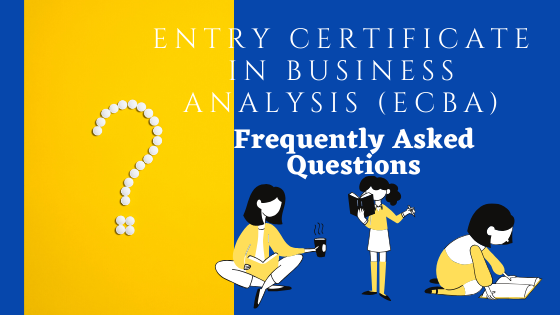
For more queries visit Entry Certificate in Business Analysis (ECBA) FAQs.
All the Preparation Resources
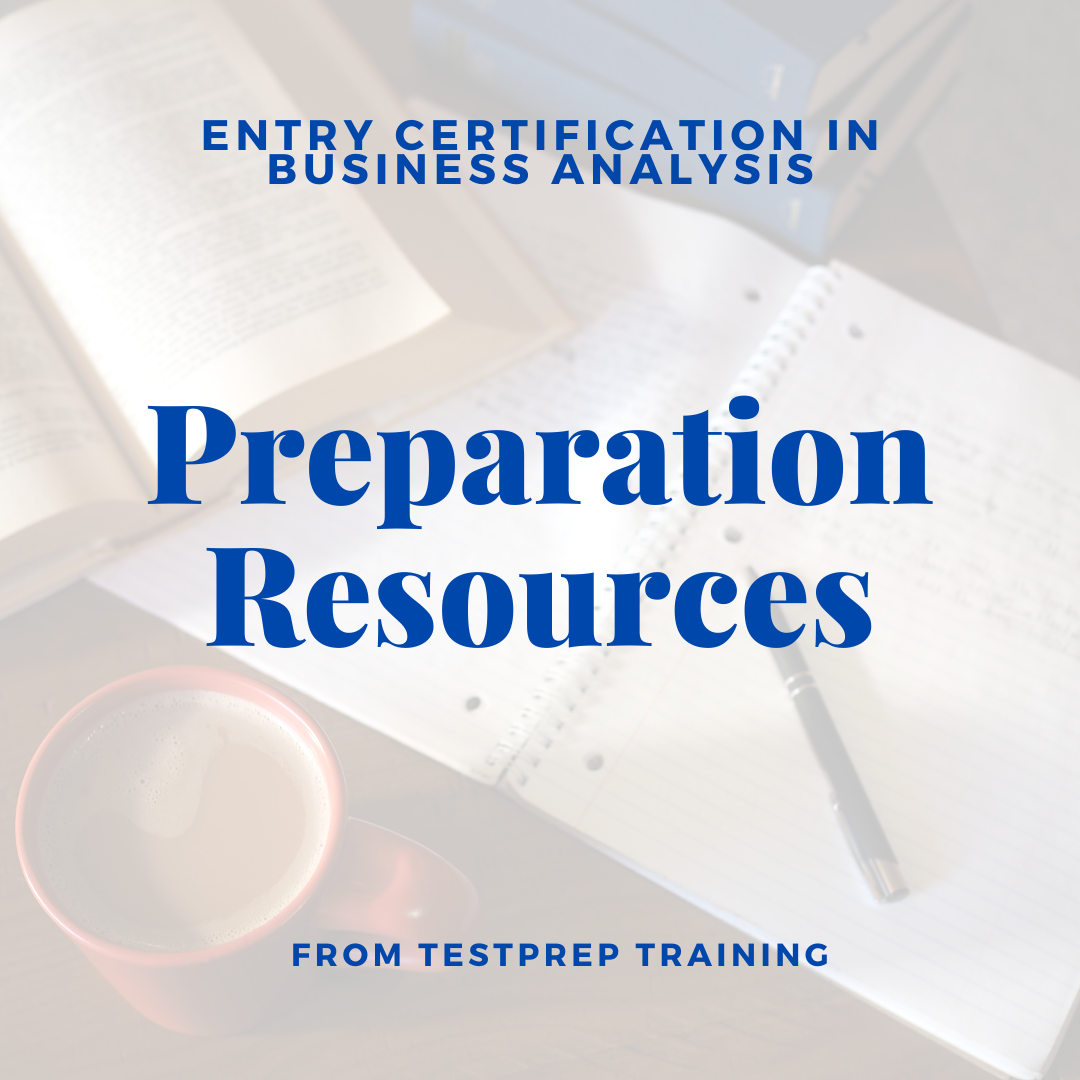
1. Gain Familiar with the Fundamentals of Business Analysis
The most important step while you prepare yourself for the exam is to be friends with the exam. You need to make yourself as much as familiar with the exam and its related concepts. For instance, if you are new to the world of business analysis, then our suggestion would first comprehend and get yourself familiar with the concepts relating to business analysis. This will help you in understanding business analysis in a much better and clear way. Since you can’t be vague with your basics, you really need to complete the basic principles and then move on to other major areas.
2. Bookmark the BABOK Guide
In addition, you can make a visit and explore the content given in the BABOK guide before you hop onto other reliable sources. The ECBA exam doesn’t revolve around so many things, rather it has a much-focused content which only BABOK guide can take you through. You need to go through the BABOK guide and then explore and focus on other areas in a rigorous manner. Once you are all set with the BABOK guide, further you can explore the ECBA exam objectives to collect an in-depth understanding of the exam objectives as they are of supreme importance for your exam.
3. Enrol for Certification Training Programs
Subsequently, if somehow or the other, the BABOK guide fails to or doesn’t contribute much to your preparation process, then you need to and you should go for ECBA certification training without any second thought to help you prepare for the exam. Preparation for the exam is not fruitful and can leave you in vain until you are not fully exposed to its basic fundamentals. Therefore, we highly suggest you join the ECBA certification training in or near your residence location. The reason being, you don’t feel strenuous while going and coming back. Also, you have the mental strength with you to help you focus on your ECBA exam preparation.
4. Important topics to consider
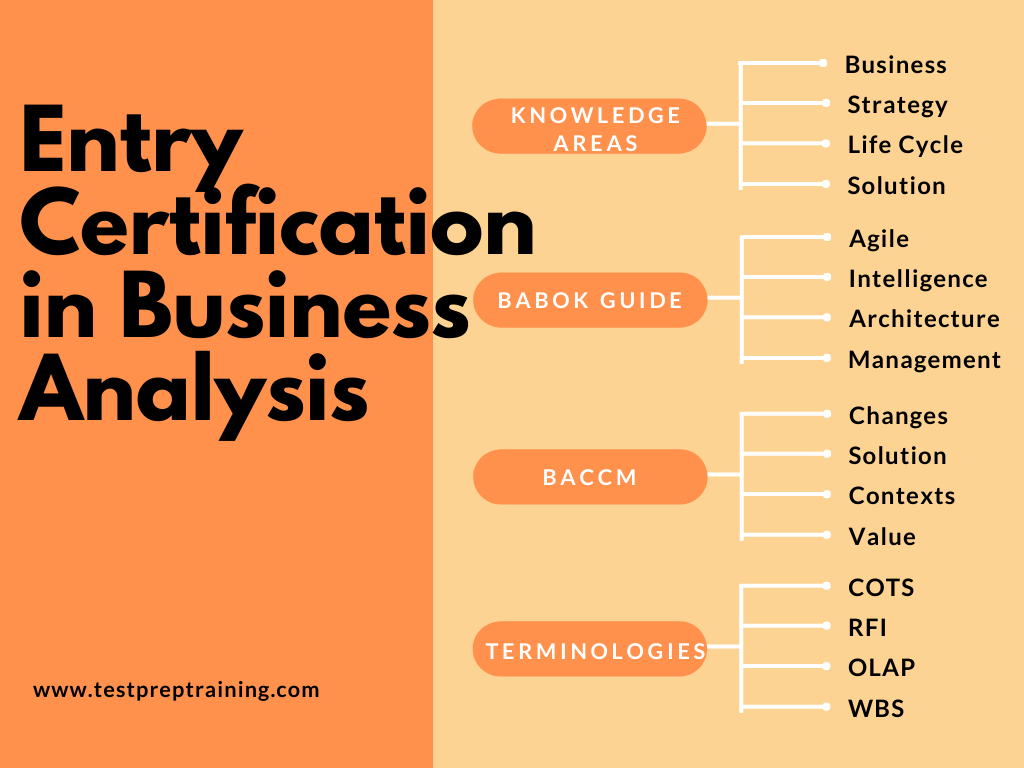
SIX Knowledge Areas
- Business Analysis Planning and Monitoring: Outlines the tasks practised to organize and coordinate business analysis efforts.
- Elicitation and Collaboration: Details the tasks utilised to prepare for and conduct elicitation activities and confirm the results.
- Requirements Life Cycle Management: Specifies the tasks applied to handle and maintain requirements and design data from inception to retirement.
- Strategy Analysis: Outlines the tasks used to classify the business need, address that need, and align the change strategy within the enterprise.
- Requirements Analysis and Design Definition: Details the tasks used to organize requirements, specify and model requirements and designs, validate and verify information, identify solution options, and estimate the potential value that could be realized.
- Solution Evaluation: Outlines the tasks used to assess the performance of and value delivered by a solution and to recommend improvements on increasing values.
Pivotal FIVE Perspectives
Perspectives are utilised within business analysis work to present focus to tasks and techniques. These are specific to the context of the initiative and may involve one or more perspectives.
The 5 perspectives incorporated in the BABOK Guide design the majority of the work BAs do:
- Firstly, Agile
- Secondly, Business Intelligence
- Subsequently, Information Technology
- Also, Business Architecture
- Not to mention, Business Process Management
Noteworthy New Techniques
BABOK Guide shares new techniques you can add to your business analysis tool belt:
- To begin with, Backlog Management
- Subsequently, Business Model Canvas
- Also, Collaborative Games
- Additionally, Decision Modelling
- Further, Financial Analysis
- Next, Prioritization
- Moreover, Process Analysis
- And, Reviews
- Not to mention, Roles and Permissions Matrix
- Lastly, 50 common BA techniques and methods
BACCM And Core Concepts
The Business Analysis Core Concept Model (BACCM) is a conceptual core for business analysis. It comprises of what business analysis is and what it means. Also, its perspective, for those performing business analysis tasks regardless of try, methodology, or level in the organization. It is constituted of six terms that have a common meaning to all business analysts. Further, this assists them to discuss both business analysis and its relationships with common terminology. Each of these terms is acknowledged to be a core concept. So, here we go-
Top Terminologies
Terminologies are one of the crucial aspects of the ECBA examination. Therefore, for your convenience, we are providing with the top terminologies that one must learn by heart.
Quick Links
It’s a good idea to go through the topics again and again. And, on top of that, if you do it via different methods. It’s more effective learning, as the expert’s say. So, for your last-minute actions, we suggest going these quick links-
- Begin with the Webinars
- Last-minute read with IIBA Bookstore
- Go Pro with Podcasts!
A quick view to all the learning resources. See the image below.
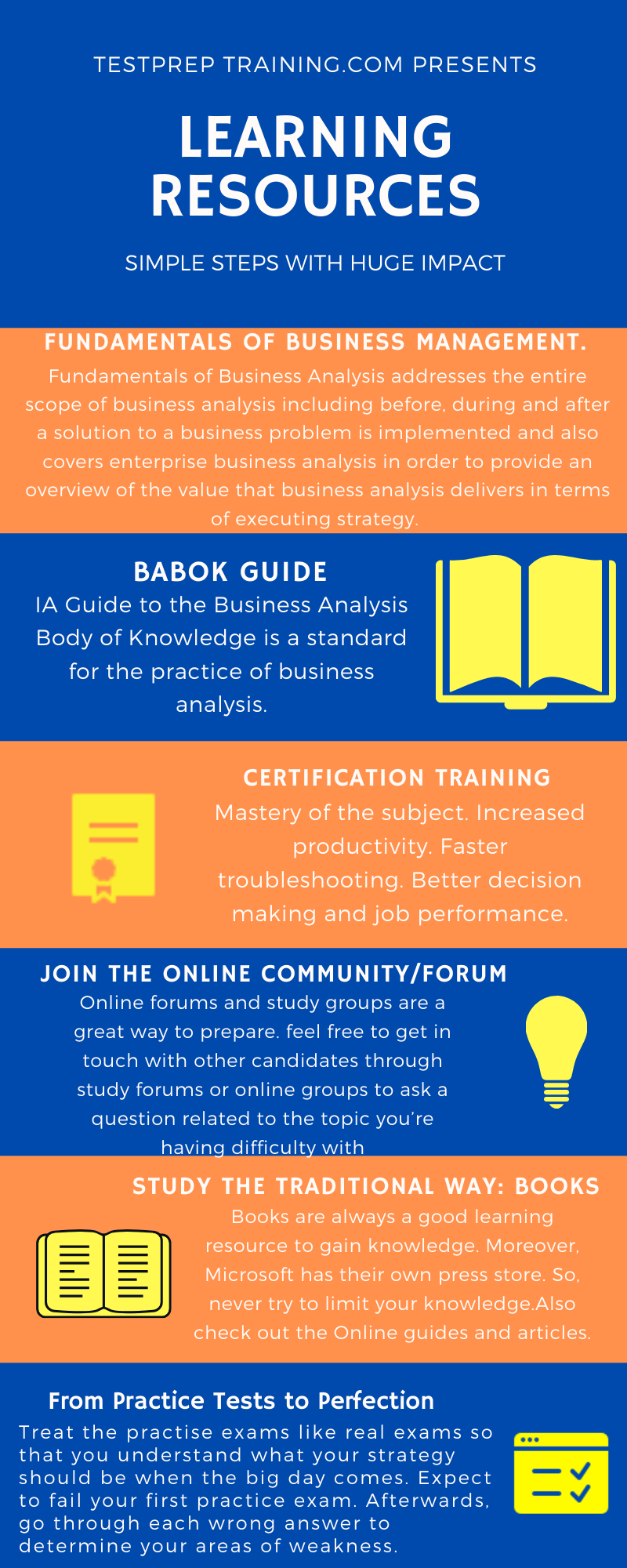
5. Evaluate yourself with Practice Tests for Perfection
Lastly, the ECBA practice exam or mock tests can be one of the advantageous tools which can back you up for the exam. Practice or mock tests are somewhat similar to the actual exam. Moreover, the main aim of to design practice test is to provide the candidate with the real exam environment. Thus, using the ECBA exam practice questions helps you find your strengths and iron out your weaknesses. They make you understand the areas you’re lacking behind and work upon them. Most importantly, make sure that you are going through practice tests once you have gone through the whole syllabus. It will help you in your evaluation prices as well as building confidence. Ready to evaluate yourself, try ECBA practice exam free test here!
6. On the day of Exam
Step 1: Log in with your credentials
Log in with your IIBA credentials and select Certification > My Certifications. Click the Schedule and Pass Exam button. Automatically, you’ll be taken to the PSI exam scheduling page.
Step 2: Before you launch your exam.
Review all the information on the PSI page including Security Procedures, required Identification Documents and Exam Instructions. This ensures you are set up for success to launch your exam.
Step 3: Click the Launch Exam button.
Check-in following the instructions on the screen. The proctor will then join the session.
Start preparing for Entry Certificate in Business Analysis Exam Now!
Learning Resources for ECBA Entry Certificate in Business Analysis
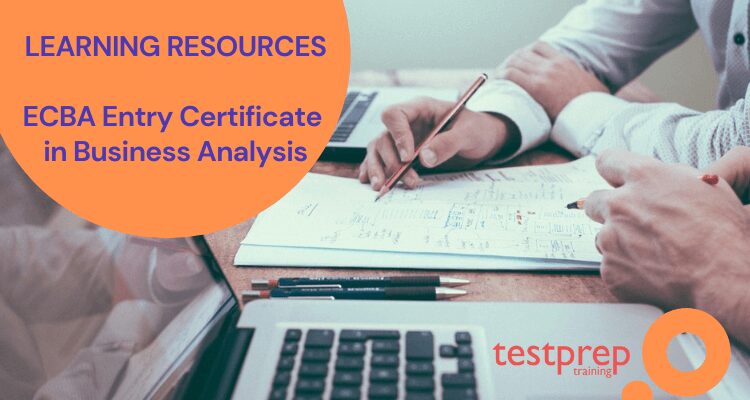
Table of Content for ECBA Entry Certificate in Business Analysis
The ECBA exam blueprint covers the following topics:
- Overview of Business Analysis
- Business Analysis Competency Model
- Business analysis of key concepts
- Techniques
- Business analysis planning and monitoring
- Elicitation and collaboration
- Requirements life cycle management
- Strategy analysis (5%)
- Requirements analysis and design definition (24%)
- Solution evaluation (1%)


